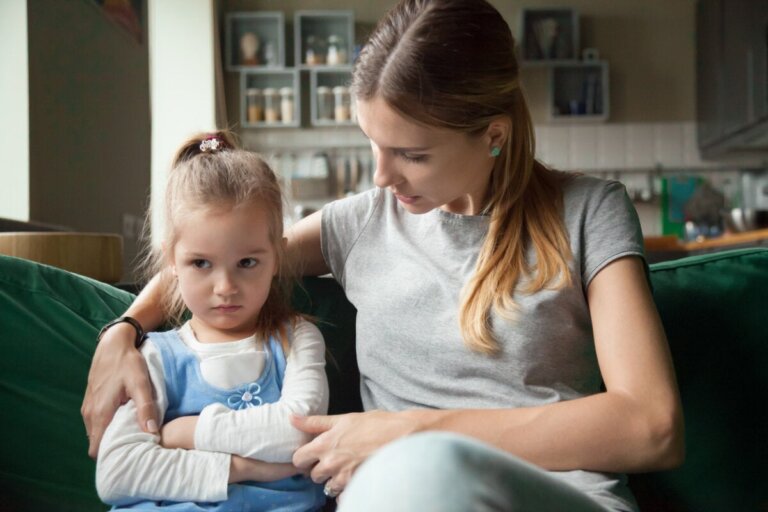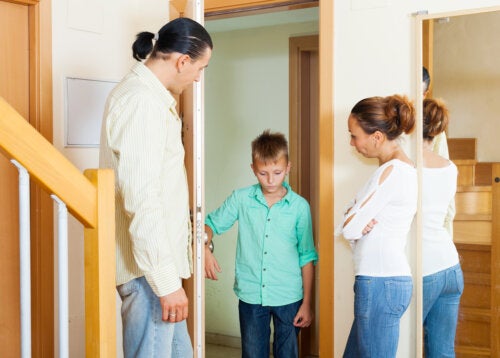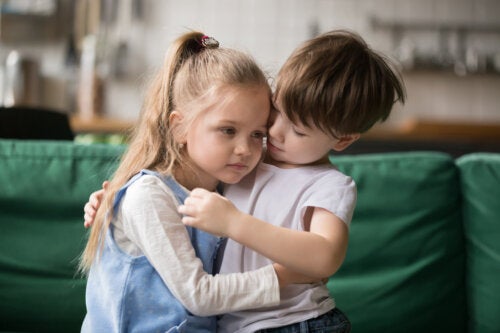Is Forcing Children to Apologize Effective?


Written and verified by the psychologist Elena Sanz Martín
During their first years of life, children learn, among other things, how to function in society. They understand how to relate to others and how their own actions can affect others. However, this requires a process, and, as is to be expected, they’ll often make mistakes. The question is, is forcing children to apologize for their mistakes the best thing to do?
The truth is that instilling manners is an important task to tackle as parents. Simple expressions such as “please,” “thank you,” or “I’m sorry” help children have healthier and more positive interactions with others.
Of course, no parent wants their child to become a little “tyrant” who tramples over the emotions and needs of others. However, forcing them to express regret isn’t always the best alternative. And here’s why.

Should children be forced to apologize?
As we said, teaching children good manners is essential. It helps them establish better relationships with other children and adults and improves their academic success and personal satisfaction. Therefore, if your child commits an offense or grievance towards another person, it’s not a good thing to let it go. On the contrary, it’s necessary to take advantage of the moment as an educational opportunity.
What happens is that we tend to rush to force the child to apologize, and then they do it reluctantly and without really feeling it. Sometimes, we forget that children’s egocentrism, a very typical trait of these years, makes it difficult for them to get out of their own perspective to consider the emotions and needs of others.
What happens when we force children to apologize? The main consequences
When we find ourselves in situations where a child has made a mistake or engaged in inappropriate behavior, it’s common for them to be taught to apologize as a way of correcting their behavior. However, forcing them to do so can have the following consequences.
The apology isn’t effective
When forcing your child to apologize to another child with whom they’ve had a conflict, the apology will most likely be in vain. In fact, an interesting study published in the journal Merrill-Palmer Quarterly suggests that children are able to distinguish between a sincere apology and an insincere one.
In fact, children between 4 and 9 years of age found that an apology was helpful in soothing the victim’s pain only when the child who had made the mistake apologized on their own initiative or did so voluntarily, but not when they were forced or coerced to do so. Moreover, in the latter case, the child was perceived in a more negative way by others.
We thus understand that forcing a child to apologize only results in an empty apology that doesn’t satisfy the offended party and may even be counterproductive.
No learning takes place
At the same time, as parents, we must ask ourselves: Do I want my child to learn to say “sorry” like an automaton, or would I really like to instill values in them?
The ultimate goal in these situations isn’t so much that the apology is pronounced, but that the child understands that they made a mistake and that their actions have affected or harmed another person. What’s sought is the development of empathy, and this isn’t achieved by forcing their words.
Forcing children to apologize causes an unhealthy habit to be acquired
At the same time, let’s bear in mind that the learning acquired during these early years shapes the child’s personality and future behavior. Therefore, it’s possible that forced and insincere apologies become a habit for the child, developing a cynical and selfish attitude in which they only apologize to avoid the negative consequences they may suffer.
In the future, this will have negative repercussions on their relationships, as they won’t be able to understand what goes wrong in the bond or to repair it. At the same time, they won’t be able to show the other person that they understand their feelings or that they care about them.

What actions should we take rather than forcing children to apologize?
As you can see, forcing children to apologize isn’t a good option. But, as we said, nor is it positive to overlook their transgressions. What can we do then? Here are some recommendations.
Wait for the right moment
It’s possible that, if they’ve had a disagreement with another child, at that very moment, your child is upset and isn’t able to reason or take perspective. Remove them from the conflict, wait for them to calm down, and then have a dialogue with them.
Help them put themselves in the other person’s shoes
For younger children, this isn’t easy to do, and they may need some guidance with open-ended questions. For example, “How would you feel if you were in the other person’s shoes?” or “Would you like to receive an apology in what way?”
Once they’ve understood what they’ve done wrong and how they’ve made the other person feel and decide that they want to apologize, guide them to do so in a timely manner.
According to a study published in the journal Negotiation and Conflict Management Research, an effective apology should include acknowledgment of responsibility, the expression of regret, and an attempt to make amends. So, for example, the child might say, “I was wrong to push you. I know I hurt you, I’m sorry. Do you want me to put a Band-Aid on you?”
Set the right example
Language teacher Matthew Burdelski, in the publication “I’m sorry, flower: Socializing apology, relationships, and empathy in Japan” reports that seeing their adult peers show empathy, acknowledge their mistakes, and apologize is an excellent way for children to learn. And, in this way, they can easily integrate such behaviors.
If you have doubts as to whether your child will be able to understand this whole process, you should know that it’s important to work on it from the earliest years.
As suggested by an article published in the British Journal of Developmental Psychology, even preschoolers understand that an apology expresses that the transgressor is sorry and is able to improve the way the victim feels.
Final recommendations
In short, when a child makes a mistake, we must focus on teaching them to develop empathy, understand how the other person feels, and learn to repair the bond that has been damaged by the bad behavior.
It doesn’t matter if, at first, they’re not able to carry out this process and apologize immediately. They can do it later, once we’ve helped them to reflect. Progressively, they’ll integrate these skills and will be more capable of doing it on their own. This will be the real learning that will enable them to have good values and develop positive relationships with others.
During their first years of life, children learn, among other things, how to function in society. They understand how to relate to others and how their own actions can affect others. However, this requires a process, and, as is to be expected, they’ll often make mistakes. The question is, is forcing children to apologize for their mistakes the best thing to do?
The truth is that instilling manners is an important task to tackle as parents. Simple expressions such as “please,” “thank you,” or “I’m sorry” help children have healthier and more positive interactions with others.
Of course, no parent wants their child to become a little “tyrant” who tramples over the emotions and needs of others. However, forcing them to express regret isn’t always the best alternative. And here’s why.

Should children be forced to apologize?
As we said, teaching children good manners is essential. It helps them establish better relationships with other children and adults and improves their academic success and personal satisfaction. Therefore, if your child commits an offense or grievance towards another person, it’s not a good thing to let it go. On the contrary, it’s necessary to take advantage of the moment as an educational opportunity.
What happens is that we tend to rush to force the child to apologize, and then they do it reluctantly and without really feeling it. Sometimes, we forget that children’s egocentrism, a very typical trait of these years, makes it difficult for them to get out of their own perspective to consider the emotions and needs of others.
What happens when we force children to apologize? The main consequences
When we find ourselves in situations where a child has made a mistake or engaged in inappropriate behavior, it’s common for them to be taught to apologize as a way of correcting their behavior. However, forcing them to do so can have the following consequences.
The apology isn’t effective
When forcing your child to apologize to another child with whom they’ve had a conflict, the apology will most likely be in vain. In fact, an interesting study published in the journal Merrill-Palmer Quarterly suggests that children are able to distinguish between a sincere apology and an insincere one.
In fact, children between 4 and 9 years of age found that an apology was helpful in soothing the victim’s pain only when the child who had made the mistake apologized on their own initiative or did so voluntarily, but not when they were forced or coerced to do so. Moreover, in the latter case, the child was perceived in a more negative way by others.
We thus understand that forcing a child to apologize only results in an empty apology that doesn’t satisfy the offended party and may even be counterproductive.
No learning takes place
At the same time, as parents, we must ask ourselves: Do I want my child to learn to say “sorry” like an automaton, or would I really like to instill values in them?
The ultimate goal in these situations isn’t so much that the apology is pronounced, but that the child understands that they made a mistake and that their actions have affected or harmed another person. What’s sought is the development of empathy, and this isn’t achieved by forcing their words.
Forcing children to apologize causes an unhealthy habit to be acquired
At the same time, let’s bear in mind that the learning acquired during these early years shapes the child’s personality and future behavior. Therefore, it’s possible that forced and insincere apologies become a habit for the child, developing a cynical and selfish attitude in which they only apologize to avoid the negative consequences they may suffer.
In the future, this will have negative repercussions on their relationships, as they won’t be able to understand what goes wrong in the bond or to repair it. At the same time, they won’t be able to show the other person that they understand their feelings or that they care about them.

What actions should we take rather than forcing children to apologize?
As you can see, forcing children to apologize isn’t a good option. But, as we said, nor is it positive to overlook their transgressions. What can we do then? Here are some recommendations.
Wait for the right moment
It’s possible that, if they’ve had a disagreement with another child, at that very moment, your child is upset and isn’t able to reason or take perspective. Remove them from the conflict, wait for them to calm down, and then have a dialogue with them.
Help them put themselves in the other person’s shoes
For younger children, this isn’t easy to do, and they may need some guidance with open-ended questions. For example, “How would you feel if you were in the other person’s shoes?” or “Would you like to receive an apology in what way?”
Once they’ve understood what they’ve done wrong and how they’ve made the other person feel and decide that they want to apologize, guide them to do so in a timely manner.
According to a study published in the journal Negotiation and Conflict Management Research, an effective apology should include acknowledgment of responsibility, the expression of regret, and an attempt to make amends. So, for example, the child might say, “I was wrong to push you. I know I hurt you, I’m sorry. Do you want me to put a Band-Aid on you?”
Set the right example
Language teacher Matthew Burdelski, in the publication “I’m sorry, flower: Socializing apology, relationships, and empathy in Japan” reports that seeing their adult peers show empathy, acknowledge their mistakes, and apologize is an excellent way for children to learn. And, in this way, they can easily integrate such behaviors.
If you have doubts as to whether your child will be able to understand this whole process, you should know that it’s important to work on it from the earliest years.
As suggested by an article published in the British Journal of Developmental Psychology, even preschoolers understand that an apology expresses that the transgressor is sorry and is able to improve the way the victim feels.
Final recommendations
In short, when a child makes a mistake, we must focus on teaching them to develop empathy, understand how the other person feels, and learn to repair the bond that has been damaged by the bad behavior.
It doesn’t matter if, at first, they’re not able to carry out this process and apologize immediately. They can do it later, once we’ve helped them to reflect. Progressively, they’ll integrate these skills and will be more capable of doing it on their own. This will be the real learning that will enable them to have good values and develop positive relationships with others.
All cited sources were thoroughly reviewed by our team to ensure their quality, reliability, currency, and validity. The bibliography of this article was considered reliable and of academic or scientific accuracy.
- Burdelski, M. (2013). “I’m sorry, flower”: Socializing apology, relationships, and empathy in Japan. Pragmatics and Society, 4(1), 54-81. https://www.jbe-platform.com/content/journals/10.1075/ps.4.1.03bur
- Escabias Gutiérrez, M. M. (2008). El egocentrismo del niño. Revista Enfoques Educativos 13, 37-42. https://www.calameo.com/read/00344544065bda4d8cdbe
- Lewicki, R. J., Polin, B., & Lount, R. B., Jr. (2016). An exploration of the structure of effective apologies. Negotiation and Conflict Management Research, 9(2), 177–196. https://onlinelibrary.wiley.com/doi/10.1111/ncmr.12073
- Smith, C. E., Chen, D., & Harris, P. L. (2010). When the happy victimizer says sorry: Children’s understanding of apology and emotion. British Journal of Developmental Psychology, 28(4), 727–746. https://bpspsychub.onlinelibrary.wiley.com/doi/abs/10.1348/026151009X475343
- Smith, C. E., Anderson, D., & Straussberger, A. (2018). Say you’re sorry: Children distinguish between willingly given and coerced expressions of remorse. Merrill-Palmer Quarterly, 64(2), 275–308. https://digitalcommons.wayne.edu/mpq/vol64/iss2/5/
This text is provided for informational purposes only and does not replace consultation with a professional. If in doubt, consult your specialist.








